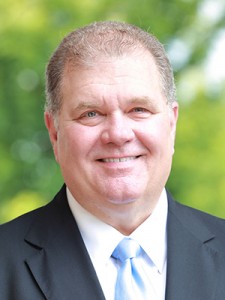Davis urges Baptists to keep watchful eye, prayerful heart on HR 5
By David Dawson
Baptist and Reflector
ddawson@tnbaptist.org
 FRANKLIN — Randy C. Davis, president and executive director of the Tennessee Baptist Mission Board, is encouraging Baptists to stay informed — and be vigilant — regarding the Equality Act, H.R. 5.
FRANKLIN — Randy C. Davis, president and executive director of the Tennessee Baptist Mission Board, is encouraging Baptists to stay informed — and be vigilant — regarding the Equality Act, H.R. 5.
The bill, if approved, would eliminate the use of the Religious Freedom Restoration Act (RFRA) as a possible protection in cases covered by the measure and would add “sexual orientation” and “gender identity” to the classifications protected in federal civil rights law.
Eliminating the use of the Religious Freedom Restoration Act would have potentially crushing ramifications for religious and faith-based organizations. Under its current application, RFRA requires the government to have a compelling interest and use the narrowest possible means in burdening a person’s religious exercise.
The Democratic-controlled House voted 236-173 for the Equality Act, H.R. 5 on May 17. Although the bill is unlikely to gain passage in the Republican-majority Senate, the momentum that it has generated should sound a warning bell for those who oppose the foundational premise of the bill, Davis said.
“The fact that this bill was introduced and received so many votes in the House is alarming, and is a commentary of where we are as a country,” said Davis. “If this bill were to pass, it potentially has far reaching consequences on religious liberty in our country and could greatly impact religious organizations.”
In 1993, Congress passed RFRA nearly unanimously as a corrective to a damaging Supreme Court ruling, and President Clinton signed it into law.
Davis said Christians have several avenues they can take in opposition of the bill. Being knowledgeable about the bill’s agenda is the first step, he said. Beyond that, there are other steps — including more participatory measures — that Christians can take to make their voices heard.
“I strongly encourage Tennessee Baptists to get informed about what’s in the bill and then I’d encourage them to contact their congressional representatives,” said Davis.
“I’d also encourage people to pray for our country, its leadership and for the boldness of Christians to speak the truth of the gospel to their family, friends and neighbors.”
When HR 5 was approved by the House two weeks ago, it marked the first time a bill to bar discrimination against people who identify as gay or transgender has gained approval in a congressional chamber.
Advocates for the Equality Act applauded the House action, and say it is needed to protect the rights of lesbian, gay, bisexual and transgender (LGBT) people in such categories as employment, housing and public accommodations — which include establishments that provide goods, services or programs.
Opponents, which include some feminists, say they oppose unjust discrimination but contend the measure would — among other ill effects — coerce behavior in violation of religious beliefs, denigrate Christian morality, roll back women’s rights and threaten pro-life laws.
The Trump administration has criticized the legislation without promising a veto.
Southern Baptist ethicist Russell Moore expressed his disappointment the House “would pass a bill as gravely misguided as the Equality Act.”
“Every human being ought to be treated with dignity, but placing sexual orientation and gender identity as protected classes in this kind of legislation would have harmful consequences,” said Moore, president of the Ethics & Religious Liberty Commission (ERLC), in written comments.
“This extreme legislation went even further by eliminating religious liberty protections and enacting what would be a 50-state ban on faith-based foster care and adoption providers,” he said. “In the name of equality, it would bully those who dare to dissent with the demands of the Sexual Revolution. We will continue to work to ensure that such a bill does not become law.”
Davis said Christians can make an impact among lawmakers by maintaining two of the core principles of the Christian faith — sharing the gospel and seeking to be Christ-like in both decisions and actions.
“Darkness only penetrates where there is an absence of light,” he said, “so we must let the light of Christ burn in us brightly.”
Kristen Waggoner, senior vice president of the U.S. legal division of Alliance Defending Freedom, said the legislation “undermines human dignity by threatening the fundamental freedoms of speech, religion, and conscience that the First Amendment guarantees for every citizen.”
The Equality Act would “force Americans to participate in events and speak messages that violate their core beliefs, all in the name of an ‘equality’ that tolerates no dissenters,” she said in a written statement.
It also would erode equality for women “by denying female athletes fair competition in sports, depriving women of business opportunities designed for them, and forcing them to share private, intimate spaces with men who identify as female,” Waggoner said.
Advocates for LGBT rights applauded the House action.
“Today’s historic vote is a major milestone for equality and sends a powerful and profound message to (LGBT) people, especially (LGBT) youth, that the U.S. House has their backs,” said Chad Griffin, president of the Human Rights Campaign (HRC), in a written release.
“No one’s rights should depend on which side of a state or city line they live on, and today we took a giant step forward in our journey toward full equality.”
HRC is the country’s largest LGBT civil rights organization.
Among the concerns regarding the Equality Act cited by the ERLC’s Moore and 11 other organizational leaders in a May 7 letter to House members:
- Houses of worship and other religious institutions could be considered “public accommodations” and become subject to government rules in violation of their beliefs.
- Faith-based adoption and foster care agencies that refuse to place children with same-sex couples would be crippled.
- Religious colleges and universities could have their ability to hire according to their beliefs and their students’ ability to receive federal aid threatened.
- Religious adherents would be coerced to participate in weddings and funerals that compromise their convictions.
— This article includes reporting by Tom Strode of Baptist Press.

